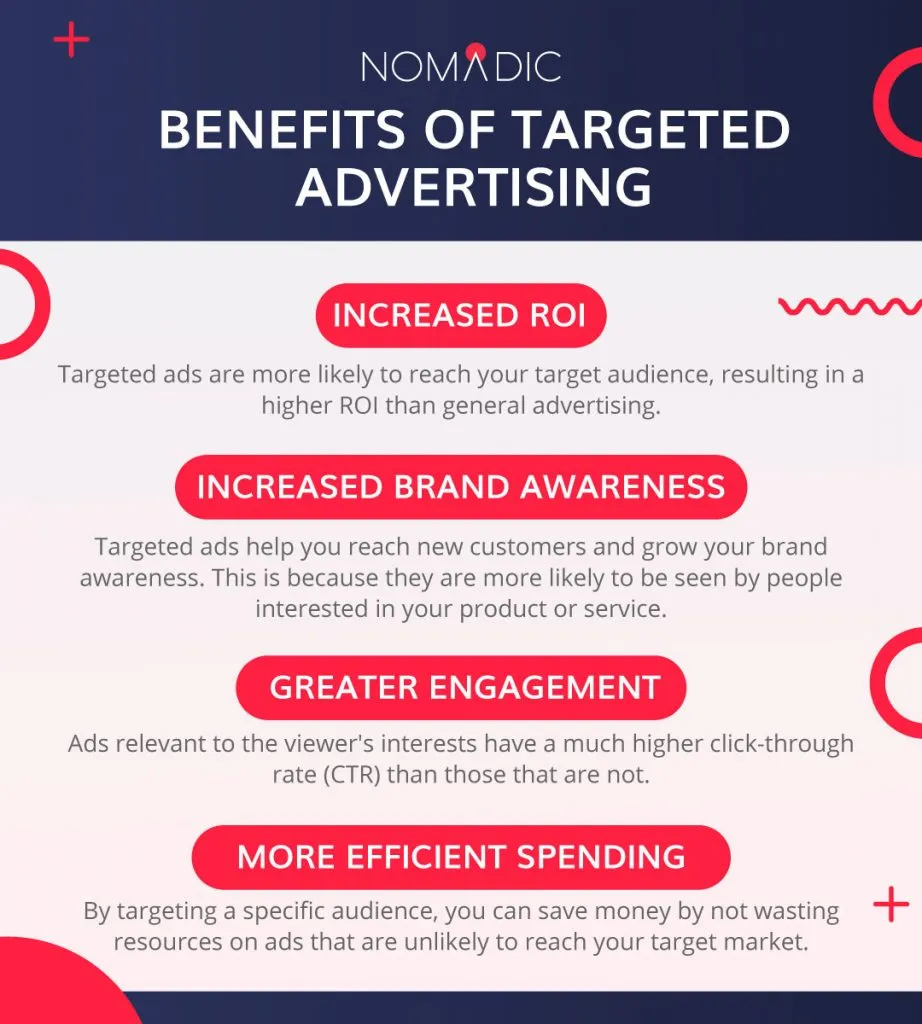SHARE

In today’s digital age, targeted ad strategies have become essential for businesses looking to maximise their return on investment (ROI) on social media. Accounting practices, in particular, can greatly benefit from harnessing the power of targeted advertising to reach their desired audience and drive business growth. In this article, we will delve into the importance of targeted ad strategies for accounting practices, explore the mechanics of targeted advertising, discuss how to develop a targeted ad strategy and highlight strategies for measuring and maximising social media ROI. Additionally, we will address the common challenges faced in implementing targeted ad strategies and provide tips for effective ad targeting amidst privacy concerns.

Understanding the Importance of Targeted Ad Strategies
In the ever-evolving marketing landscape, targeted ads have emerged as a crucial component of any successful advertising campaign. These ads are tailored to target a particular audience based on demographics, interests, and behaviour. By utilising targeted ad strategies, accounting practices can ensure that their messages reach the right people, increasing the likelihood of generating leads and conversions.
The Role of Targeted Ads in Modern Marketing
Targeted ads have revolutionised the marketing industry by allowing businesses to precisely reach their ideal customers. These ads leverage data and analytics to segment audiences and deliver personalised content, ultimately leading to higher engagement and conversion rates.
Why Accounting Practices Need Targeted Ad Strategies
Accounting practices often face the challenge of targeting a niche audience. By implementing targeted ad strategies, they can effectively allocate their advertising budget towards reaching potential clients more likely to engage with their services. Furthermore, targeted ads enable accounting practices to showcase their expertise and unique value proposition to those interested in financial services. Expanding on the importance of targeted ad strategies, it is essential to highlight the role of advanced targeting options available on popular advertising platforms. These options include but are not limited to geotargeting, which allows accounting practices to focus their ads on specific geographic locations where their services are most in demand.
Additionally, behavioural targeting enables the delivery of ads based on users’ past online behaviour, ensuring that the right message reaches the right audience at the right time. The effectiveness of targeted ad strategies can be further enhanced by incorporating retargeting techniques. This involves showing ads to users who visited the accounting practice’s website but did not take the desired action, such as filling out a contact form. By retargeting these users with tailored ads, accounting practices can increase brand recall and encourage them to revisit the website to complete the desired action, ultimately improving conversion rates and ROI.The mechanics of targeted advertising
Targeted advertising relies on advanced algorithms and technologies to deliver ads to specific audiences. Accounting practices can optimise their campaigns for maximum impact and ROI by understanding the mechanics behind targeted ads. This sophisticated approach allows businesses to tailor their marketing efforts to reach the most relevant audience. By analysing data points such as browsing history, purchase behaviour, and social interactions, advertisers can create highly personalised campaigns that resonate with potential customers on a deeper level.
How Targeted Ads Work on Social Media
On social media platforms, targeted ads leverage user data such as demographics, interests, and online behaviours. Advertisers can specify their audience criteria, and the platforms use their algorithms to display the ads to users who fit the desired profile. This precise targeting ensures that accounting practices can reach individuals most likely interested in their services. Social media platforms offer many targeting options, allowing businesses to narrow their audience based on location, age, interests, and even life events. This level of specificity increases the chances of engagement and helps accounting practices allocate their advertising budget more effectively, reaching those who are more likely to convert into valuable clients.
Key Elements of a Successful Targeted Ad
Successfully targeted ads incorporate various key elements, including compelling visuals, persuasive copy, and a clear call to action. By creating visually appealing ads that resonate with their target audience and provide a clear next step, accounting practices can significantly increase the chances of conversion. In addition to the visual and textual components, the timing of targeted ads also plays a crucial role in their effectiveness. By analysing when their target audience is most active online, accounting practices can schedule their ads to appear at optimal times, ensuring maximum visibility and engagement.

Developing a Targeted Ad Strategy For Your Accounting Practice
Now that we understand the importance and mechanics of targeted advertising, it is time to develop a strategy for your accounting practice. This involves identifying your target audience, choosing the right social media platforms, and crafting compelling ad content.
Identifying Your Target Audience
Before creating ads, it is critical to define your target audience. Consider characteristics such as age, occupation, location, and industry to narrow down your focus. Understanding your audience’s pain points and motivations will allow you to create more personalised and impactful ads. For instance, if your accounting practice specialises in providing tax planning services to small businesses, your target audience may be entrepreneurs and business owners looking for expert advice to navigate complex tax regulations. By understanding their specific needs and challenges, you can tailor your ad content to address their pain points directly, positioning your accounting practice as the solution they’ve been searching for.
Choosing the Right Social Media Platforms
Not all social media platforms are created equal when it comes to advertising. Research and analyse which platforms your target audience frequents the most. Platforms like LinkedIn and Twitter might be more effective if your accounting practice primarily serves small businesses. On the other hand, if your ideal clients need personal financial services, platforms like Facebook and Instagram may be more suitable. Let’s take a closer look at LinkedIn, for example. As a professional networking platform, LinkedIn provides a unique opportunity to connect with business professionals actively seeking accounting services. Leveraging LinkedIn’s advanced targeting options allows you to narrow your audience based on factors such as job title, industry, and company size. This precision targeting ensures that your ads reach the right people at the right time, maximising your chances of generating quality leads for your accounting practice.
Crafting Compelling Ad Content
Once you know your target audience and the platforms you will be advertising on, it’s time to craft compelling ad content. Ensure your ads highlight your accounting practice’s unique value, address pain points that resonate with the audience, and have a clear call-to-action. Consider incorporating testimonials or success stories from satisfied clients to build trust and credibility. Sharing real-life examples of how your accounting services have helped businesses save money or streamline their financial processes can be incredibly persuasive. Additionally, eye-catching visuals, such as infographics or videos, can help grab your audience’s attention and make your ads more memorable.
Remember, crafting compelling ad content is an ongoing process. It’s essential to test different ad formats, headlines, and visuals to optimise your ad performance. Analyse the data and metrics the social media platforms provide to gain insights into what resonates with your audience and adjust your strategy accordingly. By continuously refining your ad content, you can ensure that your accounting practice stays relevant and competitive in the ever-evolving digital landscape.
![]()
Measuring and Maximising Social Media ROI
Measuring the return on investment (ROI) of your social media efforts is crucial to ensuring the effectiveness of your targeted ad strategies. By tracking and analysing key metrics, accounting practices can identify areas for improvement and take steps to maximise their social media ROI.
Understanding Social Media Metrics
Social media platforms provide valuable metrics such as reach, engagement, click-through rates, and conversions. By monitoring these metrics, accounting practices can evaluate the success of their campaigns and make data-driven decisions to optimise their strategies. Tools for tracking social media ROI Various tools are available to help accounting practices track their social media ROI. Google Analytics, for example, offers insights into the traffic and conversions generated from social media platforms. Additionally, many social media management tools provide in-depth reports and analytics to measure campaign effectiveness. Strategies for Improving Social Media ROI
Accounting practices can take several strategic steps to maximise social media ROI. Firstly, they can optimise their ad targeting based on data analysis and user feedback. Secondly, incorporating A/B testing can help identify the most effective ad formats, headlines, and visuals. Finally, consistently creating informative and valuable content can build trust and credibility, leading to long-term client relationships. Overcoming challenges in implementing targeted ad strategies While targeted ad strategies can deliver substantial benefits, accounting practices may encounter some common challenges when implementing them. Understanding these challenges can help practices overcome them and ensure the success of their ad campaigns.
Common Pitfalls in Targeted Advertising
One common pitfall is forgetting to regularly assess and refine your target audience. As market dynamics change, your audience’s preferences and characteristics may evolve. By continuously analysing audience behaviour and updating your targeting criteria, you can keep your ads relevant and effective.
Tips For Effective Ad Targeting Amidst Privacy Concerns
Privacy concerns have become increasingly prevalent, resulting in stricter regulations and users being more cautious online. To navigate these concerns, accounting practices should prioritise transparency and consent. Communicate how user data is used and stored and ensure compliance with relevant data protection regulations. By addressing privacy concerns, practices can build trust and establish a positive brand image among their target audience. In conclusion, targeted ad strategies are vital in maximising social media ROI for accounting practices. By understanding the importance and mechanics of targeted advertising, developing a strategic approach, and measuring performance, practices can effectively reach their target audience and achieve their business goals. Additionally, by overcoming challenges and addressing privacy concerns, practices can create impactful, targeted ad campaigns that drive growth and success. Stay ahead of the competition by embracing the power of targeted ad strategies in today’s digital marketing landscape.
Frequently Asked Questions About Targeted Ad Strategies For Accounting Practices
What Are Targeted Ad Strategies For Accounting Practices?
Targeted ad strategies involve creating personalised advertising campaigns on social media platforms focused on specific segments of your audience to increase engagement, drive leads, and convert clients specifically interested in accounting services.
How Can Accounting Practices Increase Their Social Media ROI?
Accounting practices can increase their social media ROI by utilising data-driven insights to craft relevant ads, engaging with their audience through tailored content, and continuously monitoring and adjusting strategies based on performance analytics.
What Are the Benefits of Using Targeted Ads On Social Media For Accounting Firms?
The benefits include higher engagement rates, improved lead generation, increased conversion rates, enhanced brand awareness amongst relevant audiences, and a better understanding of client needs and preferences.
What Best Practices Should Be Followed When Implementing Targeted Ad Campaigns?
Best practices include defining clear objectives, understanding your target audience deeply, utilising high-quality, relevant content, testing different ad formats and messages, and leveraging analytics for ongoing optimisation.









